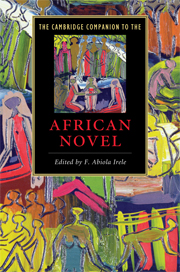Book contents
- Frontmatter
- 1 Introduction: perspectives on the African novel
- 2 The oral-literate interface
- 3 Chinua Achebe and the African novel
- 4 Protest and resistance
- 5 The Afrikaans novel
- 6 The African novel in Arabic
- 7 The francophone novel in North Africa
- 8 The francophone novel in sub-Saharan Africa
- 9 The African historical novel
- 10 Magical realism and the African novel
- 11 The African novel and the feminine condition
- 12 Autobiography and Bildungsroman in African literature
- 13 The postcolonial condition
- 14 New voices, emerging themes
- 15 The critical reception of the African novel
- Bibliography
- Index
3 - Chinua Achebe and the African novel
Published online by Cambridge University Press: 28 January 2010
- Frontmatter
- 1 Introduction: perspectives on the African novel
- 2 The oral-literate interface
- 3 Chinua Achebe and the African novel
- 4 Protest and resistance
- 5 The Afrikaans novel
- 6 The African novel in Arabic
- 7 The francophone novel in North Africa
- 8 The francophone novel in sub-Saharan Africa
- 9 The African historical novel
- 10 Magical realism and the African novel
- 11 The African novel and the feminine condition
- 12 Autobiography and Bildungsroman in African literature
- 13 The postcolonial condition
- 14 New voices, emerging themes
- 15 The critical reception of the African novel
- Bibliography
- Index
Summary
“People create stories create people; or rather, stories create people create stories.” Chinua Achebe / Chinua Achebe achieved canonization with his first novel, Things Fall Apart, and he has retained his top ranking in the African literary canon. Given the notoriously unstable character of literary reputations, his reputation has retained a remarkably steady place in the canon through a whole generation, covering the last half of the twentieth century. But while objective proofs of his reputation are easy to produce – witness Lindfors’s quantitative audit and the anniversary celebrations (conferences, colloquia, Festschrifts) – these cannot be true indicators of his real achievement which can only be indirectly gleaned in the transformation of the fictive tradition and in the confessional complexion of the reception history, or signs of the changing attitudes to the colonial image in the restructuring of school curricula. His essays are major contributions to the growth of postcolonial theory and indigenous knowledge systems. But these essays are primarily by-products of his creative practice which expressed itself in the novel form. It is a tribute to Achebe’s art that the studies of his novels, as well as his own essays, are among the landmarks of the scholarship on African literature. It is not that Achebe’s writing is completely free from critical controversy and disagreements although, given the very nature of his achievement, it is remarkable that it is relatively so. Although his essay on Joseph Conrad, “An Image of Africa” (in Hopes and Impediments), has continued to generate critical arguments and various re-evaluations of Conrad – and incidentally of Joyce Cary – his position is in fact less controversial than reactions to it suggest. Achebe is concerned not so much with Conrad’s place in the English tradition as with the effect of his romantic view of language and reality on his representation of Africa.
- Type
- Chapter
- Information
- The Cambridge Companion to the African Novel , pp. 31 - 50Publisher: Cambridge University PressPrint publication year: 2009
- 1
- Cited by

